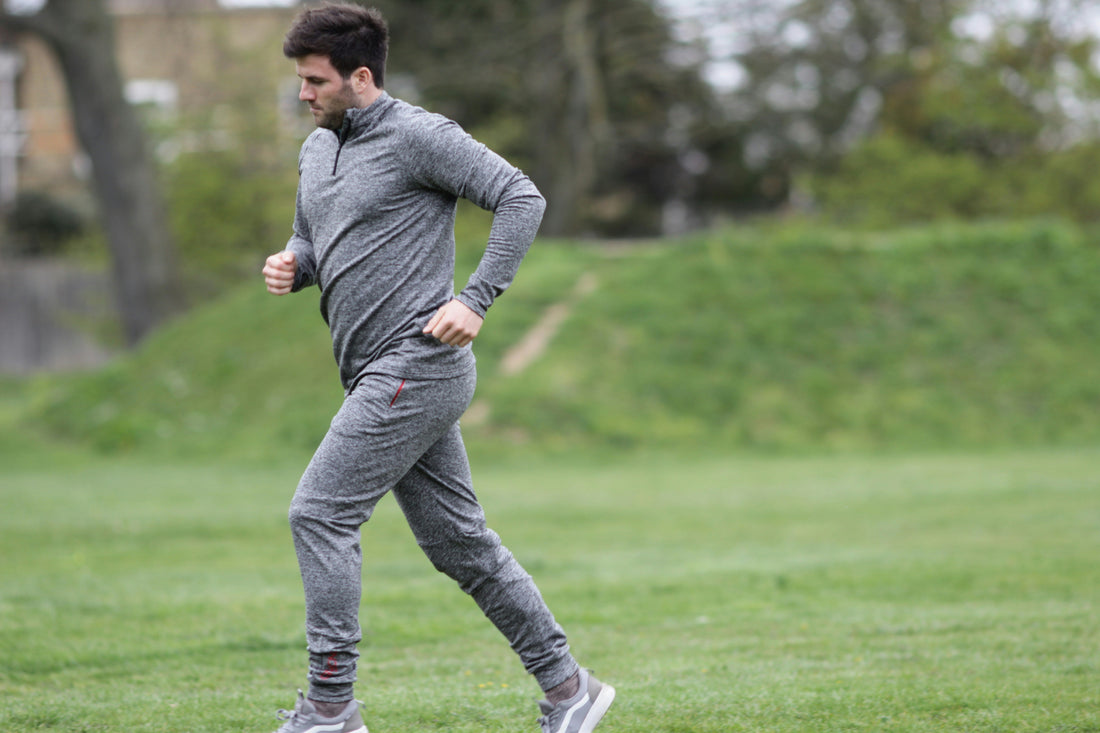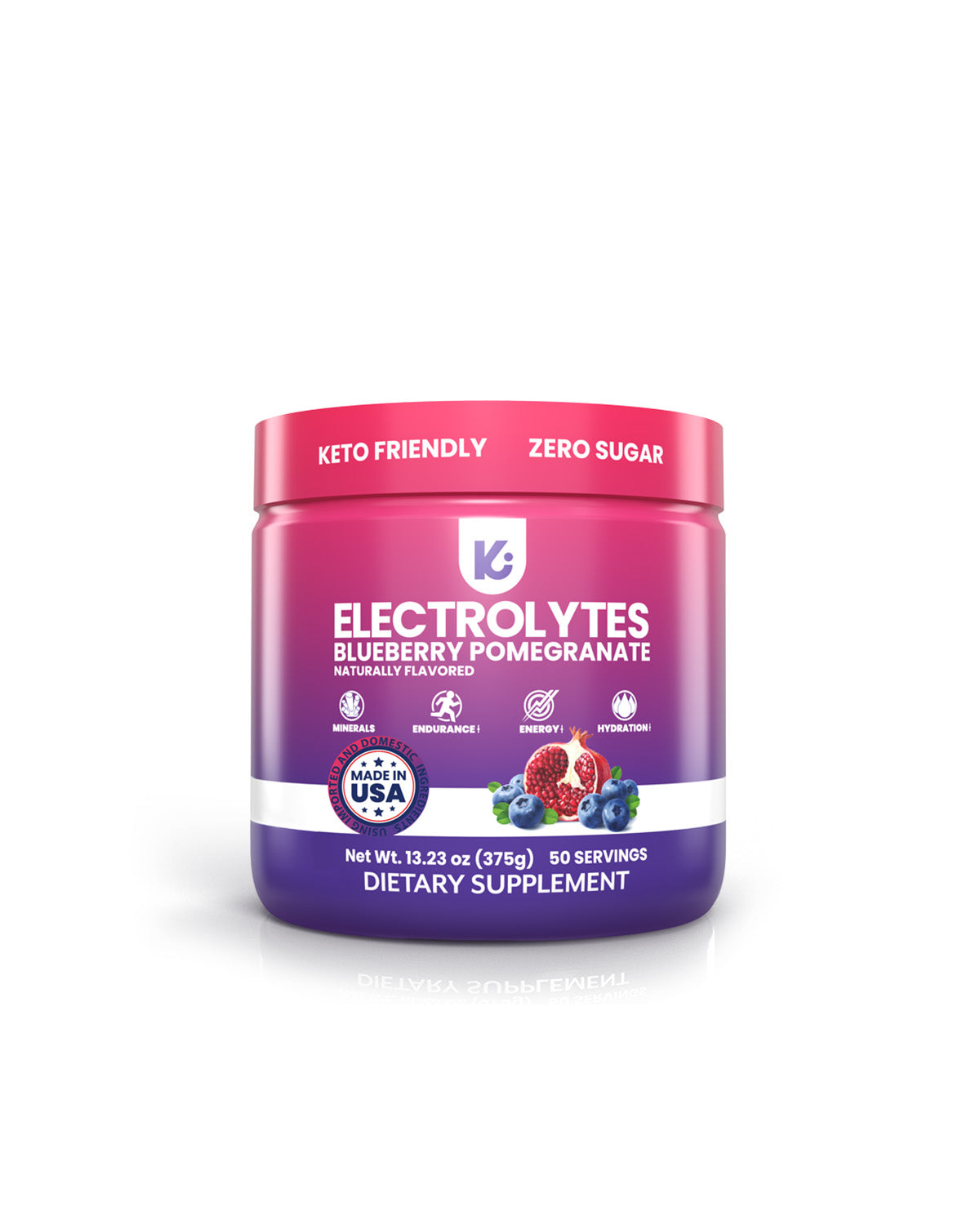
Can Electrolyte Drinks Help with Muscle Recovery?
Share
Keywords: electrolyte drinks, muscle recovery, hydration, electrolytes for athletes, sodium potassium magnesium calcium, zero sugar electrolyte powder, Keppi Blueberry Pomegranate, keto-friendly electrolytes, rehydration, post-workout recovery.
Can Electrolyte Drinks Help with Muscle Recovery?
If you've ever pushed your limits at the gym or during a run, you know that muscle soreness and lingering fatigue can get in the way of your next session. Regular water might not cut it when you've lost key minerals through sweat—how well you replenish those nutrients affects overall recovery, hydration, and performance (Sawka et al., 2007; Cheuvront & Kenefick, 2014). The science behind electrolyte drinks shows real promise for supporting hydration and helping you get back to activity sooner, especially if you’re training in heat or for long durations (Shirreffs & Maughan, 2008).
In this guide, we’ll explore how electrolytes target pain points in recovery and when they’re worth adding to your daily routine.
What You'll Learn
- How electrolytes impact muscle performance and recovery (MedlinePlus, 2024)
- The most important minerals for hydration: sodium, potassium, magnesium, calcium (IOM, 2005)
- Potential benefits of electrolyte drinks over water (WHO, 2006)
- Science-backed ways to use electrolytes for recovery (Sawka et al., 2007)
- Expert guidance on fast-tracking results with zero-sugar electrolyte powder
Quick Summary
Electrolyte drinks restore minerals lost in sweat and can speed effective rehydration versus water alone, helping reduce cramps and support post-exercise recovery (WHO, 2006; Sawka et al., 2007). Choose clean, zero-sugar formulas balanced with sodium, potassium, magnesium, and calcium.
Learn more about Blueberry Pomegranate Electrolyte Drink MixWhat Are the Key Elements in Electrolyte-Powered Recovery?
- Electrolyte Balance
- Essential Minerals: Sodium, Potassium, Magnesium, Calcium
- Faster Hydration vs. Water Alone
- Added Nutrients for Muscle Repair
- How to Choose the Right Electrolyte Drink
Electrolyte Balance and Muscle Function
Electrolyte balance sits at the heart of muscle and nerve function. Sodium and potassium gradients generate electrical impulses; calcium enables contraction; magnesium helps muscles relax. Sweat losses without replacement increase the risk of cramps, fatigue, and performance dips (MedlinePlus, 2024; de Baaij et al., 2015; IOM, 2005).
- Electrolytes enable contraction–relaxation cycles in muscle (MedlinePlus, 2024)
- Imbalances can contribute to cramps and premature fatigue (Cheuvront & Kenefick, 2014)
- Balanced intake supports nerve signaling and steady output (Sawka et al., 2007)

Essential Minerals: Sodium, Potassium, Magnesium, Calcium
Sodium drives water absorption and helps regulate plasma volume; potassium supports cardiac rhythm and muscle cell excitability; magnesium participates in over 300 enzymatic reactions including muscle relaxation; calcium triggers contraction and supports tissue repair (IOM, 2005; de Baaij et al., 2015; MedlinePlus, 2024).
Falling short on any of these—especially after heavy sweating—can show up as cramps, slower recovery, and lower training quality (Shirreffs & Maughan, 2008).
- Sodium facilitates fluid regulation and nutrient transport (WHO, 2006)
- Potassium supports heart and muscle activity (MedlinePlus, 2024)
- Magnesium assists contraction and relaxation (de Baaij et al., 2015)
- Calcium helps trigger force production in muscle (MedlinePlus, 2024)
“Replacing the electrolytes you lose in sweat—especially sodium and potassium—improves fluid balance and helps sustain performance during and after hard efforts.”
Faster Hydration vs. Water Alone
Plain water quenches thirst, but it doesn’t replace salts lost in sweat. Formulas modeled after oral rehydration science use sodium (and co-transport principles) to speed water uptake and retention, rehydrating more effectively than water alone (WHO, 2006; Wright & Ghezzi, 2013; Sawka et al., 2007). That can reduce post-exercise soreness related to fluid–electrolyte deficits and support quicker return to training (Shirreffs & Maughan, 2008).
- Replaces salts lost in sweat (Sawka et al., 2007)
- Supports quicker restoration of fluid balance (WHO, 2006)
- Helps maintain neuromuscular function post-exercise (MedlinePlus, 2024)
Quick, quality hydration can make a real difference—especially if you’re training in heat or stacking sessions. Learn more about electrolyte hydration.
Added Nutrients for Muscle Repair
Some electrolyte blends include B-vitamins for energy metabolism and antioxidants to counter exercise-induced oxidative stress—adjuncts that may support recovery alongside a balanced diet (Powers & Jackson, 2008; NIH ODS, 2024). If you prefer a minimal label or are keto-focused, a zero-sugar formula with core minerals is a clean, effective base.
- B-vitamins support energy metabolism (NIH ODS, 2024)
- Antioxidants help buffer exercise-induced oxidative stress (Powers & Jackson, 2008)
- Zero-sugar options avoid unnecessary calories and spikes
How to Choose the Right Electrolyte Drink
The quality of your electrolyte drink matters. For muscle recovery and everyday hydration:
- Balance: sodium + potassium + magnesium + calcium (IOM, 2005)
- Clean label: zero sugar, no artificial dyes
- Mixability: dissolves quickly for consistent dosing
Smart choices lead to better, faster recovery and more consistent performance.
Blueberry Pomegranate Electrolyte Drink Mix: Your Fast-Track to Recovery
When muscle fatigue and dehydration slow you down, a full-spectrum, zero-sugar electrolyte powder can offer convenient, effective support.
Keppi’s Blueberry Pomegranate Electrolyte Drink Mix delivers sodium, potassium, magnesium, and calcium in a clean, great-tasting formula—ideal for fast rehydration and day-to-day recovery.
Replenish, Repair, Perform — How to Use Electrolyte Drinks
- Mix one serving with water immediately after exercise to jump-start rehydration (Shirreffs & Maughan, 2008).
- Sip through the day to maintain fluid–electrolyte balance.
- Adjust intake for heat, sweat rate, and duration (Sawka et al., 2007).
- Pair with balanced protein and carbs for optimal muscle repair.
Key Features of Blueberry Pomegranate Electrolyte Drink Mix
- Zero sugar and no artificial ingredients for clean hydration
- Full spectrum minerals to support post-workout recovery
- Fine powder dissolves easily; refreshing flavor supports compliance

Blueberry Pomegranate Electrolyte Drink Mix
Enjoy full-spectrum hydration with sodium, potassium, magnesium & calcium—perfect for post-workout rehydration or daily recovery. Zero sugar, clean ingredients.
“After switching to a balanced, zero-sugar electrolyte mix, my post-run cramps disappeared and I could stack quality sessions again.”
Conclusion: Electrolytes Support Muscle Recovery Potential
Electrolyte drinks can improve rehydration versus plain water and help maintain neuromuscular function by replacing sodium, potassium, magnesium, and calcium—key for muscle recovery and steady performance (WHO, 2006; Sawka et al., 2007; MedlinePlus, 2024). Choose balanced, zero-sugar options, adjust for sweat and climate, and pair with smart nutrition to get more from every training block.
References
- Cheuvront, S.N. & Kenefick, R.W. (2014) Dehydration: physiology, assessment, and performance effects. Comprehensive Physiology, 4(1), 257–285.
- de Baaij, J.H.F., Hoenderop, J.G.J. & Bindels, R.J.M. (2015) Magnesium in man: implications for health and disease. Physiological Reviews, 95(1), 1–46.
- Institute of Medicine (2005) Dietary Reference Intakes for Water, Potassium, Sodium, Chloride, and Sulfate. Washington, DC: National Academies Press.
- MedlinePlus (2024) Electrolytes—what they are and how they’re measured. U.S. National Library of Medicine. https://medlineplus.gov/lab-tests/electrolytes/
- Powers, S.K. & Jackson, M.J. (2008) Exercise-induced oxidative stress: cellular mechanisms and impact on muscle force production. Physiological Reviews, 88(4), 1243–1276.
- Sawka, M.N. et al. (2007) American College of Sports Medicine position stand: Exercise and fluid replacement. Medicine & Science in Sports & Exercise, 39(2), 377–390.
- Shirreffs, S.M. & Maughan, R.J. (2008) Rehydration and recovery of fluid balance after exercise. Sports Medicine, 38(5), 407–425.
- WHO (2006) Oral rehydration salts: Production of the new ORS. Geneva: World Health Organization.
- Wright, E.M. & Ghezzi, C. (2013) The sodium–glucose cotransporter SGLT1. Pflügers Archiv, 465, 479–497.
- NIH ODS (2024) B-Vitamins Fact Sheets for Health Professionals. Office of Dietary Supplements. https://ods.od.nih.gov/
